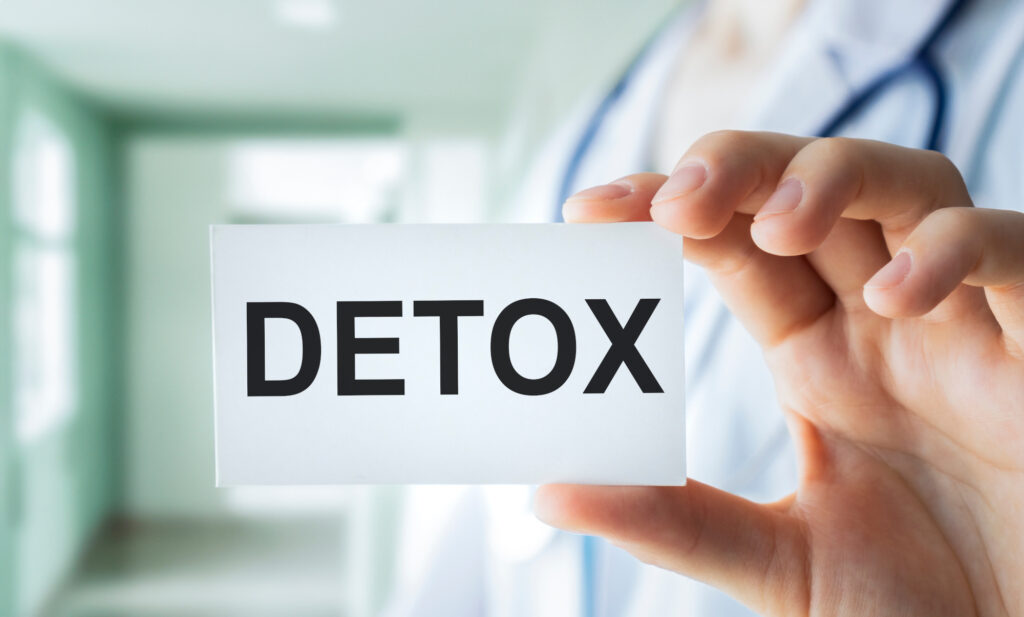Call Today: (800) 410-6552
Are you struggling with drinking and ready to rebuild your life? You’re not alone. According to a 2022 National Survey on Drug Use and Health (NSDUH), 29.5 million people ages 12 and older had alcohol use disorder. In another study, it was found that 1 in 3 Americans’ alcohol consumption puts them at risk for alcohol dependence. It’s an ongoing problem with no clear solution.
Why is alcohol use so harmful? It’s not just about the poor decisions we make while drinking. In 2021 in the U.S., excessive alcohol use caused about 178,000 deaths and 4 million years of potential life lost. It causes increased risk of injuries, chronic diseases, cancers, and poor pregnancy outcomes. On top of all that, the difficulty of completing the detox process without treatment makes it incredibly hard to stop.
Detoxing from alcohol is a crucial first step in recovery, and it’s important to do it under medical supervision. We’ve created this comprehensive guide to alcohol detox to provide essential information about the detox process, from the initial decision to seek help through the recovery journey that follows. Remember: recovery is possible, and you don’t have to do it alone. Keep reading to learn more about how you can detox with SCRC and start a new chapter of your life.
Alcohol detox is the first step in treating alcohol dependence and involves removing alcohol from the body completely. This process addresses the physical dependence on alcohol and initiates a period of adjustment that prepares the body for a sober state. During detox, the body begins to heal from the damaging effects of alcohol while the risk of withdrawal symptoms is managed under medical supervision. Effective alcohol detox is crucial as it sets the foundation for further treatments and long-term recovery strategies.

Detoxing from alcohol should always be done under medical supervision to ensure safety and efficacy. At SCRC, the process begins with a comprehensive assessment by healthcare professionals to determine the level of dependence and any co-existing health issues. Treatment often includes medication management to ease withdrawal symptoms, nutritional support, and fluid replacement. Counseling and support groups are also integral during this phase to help address the psychological challenges associated with detox. A controlled, supervised setting ensures the best outcomes and prepares individuals for ongoing addiction treatment.
Typically, detox can last from a few days to over a week, but the duration of the alcohol detox process varies depending on several factors, including the severity of a client’s alcohol dependence, the duration of alcohol use, the presence of co-existing medical or mental health conditions, and the individual’s overall health. Withdrawal symptoms can appear within a few hours after the last drink and may peak around 24 to 72 hours, with some symptoms potentially lasting weeks. Accurate monitoring during this time is essential to manage any complications that arise.
Alcohol detox generally progresses through several stages, starting within hours of the person’s last alcohol consumption. Initially, individuals may experience mild symptoms like anxiety, insomnia, and nausea. As the detox progresses, these can escalate to more severe symptoms such as increased heart rate, high blood pressure, and possibly delirium tremens (DTs). The final stage often involves a tapering off of symptoms as the body stabilizes. Throughout each stage, our medical professionals monitor and adjust treatments as needed to reduce discomfort and ensure safety.

Detox from alcohol is an emotional and physical adjustment. When you detox from alcohol, your body undergoes significant changes as it adjusts to functioning without alcohol. Successfully moving through detox can lead to improved physical and mental health, setting a positive trajectory for comprehensive addiction treatment—but the withdrawal symptoms can make it difficult to complete the detox alone. Emotional support and medical interventions are critical during this time to manage symptoms and prevent complications and relapse.
Withdrawal symptoms during alcohol detox can range from mild to life-threatening. Early symptoms typically include headache, sweating, nausea, insomnia, and anxiety. As the detox process continues, symptoms may escalate to include confusion, hallucinations, high blood pressure, fever, and seizures. The most severe withdrawal condition, delirium tremens (DTs), can occur in about 5% of individuals and is characterized by severe confusion, tremors, and high fever. Medical supervision helps manage these symptoms safely.
When it comes to quitting alcohol, medical detox is always the best option. Withdrawal symptoms can rapidly worsen, leading to severe health risks and a greater risk of relapse. Professional detox facilities offer medical oversight, medication to ease withdrawal symptoms, and support in a controlled environment. These measures significantly lower the risk of complications, make the client more comfortable, and improve the efficacy and safety of the detox process.
Sometimes, medications used in alcohol detox help manage withdrawal symptoms and reduce the risk of severe complications. Commonly used medications include benzodiazepines (like diazepam and lorazepam) to reduce anxiety and improve sleep, anticonvulsants to prevent seizures, and beta-blockers to reduce heart rate and blood pressure. Each medication is administered under strict medical supervision to ensure safety and effectiveness during the detox process.
Undergoing alcohol detox is crucial for breaking the cycle of dependence and starting the journey towards lasting sobriety. Alcohol detox is not just a physical process—it’s also mentally transformative. It helps clear the mind, stabilize the body, and reduce the physical cravings for alcohol. Detox provides a safe environment to cope with withdrawal symptoms under medical supervision, which significantly improves the likelihood of transitioning into long-term treatment and recovery.

Southern California Recovery Centers (SCRC) provide a unique blend of clinical excellence and compassionate care. We focus on vocational and life skills, trauma therapy, structured environments, and ongoing care in a refined process that has successfully helped thousands of men reintegrate into life and discover their purpose. Our expert team is dedicated to delivering personalized treatment plans that address the specific needs and challenges of each individual, ensuring a more effective and lasting recovery.

Experience top-tier alcohol detox services with SCRC in San Diego. The city’s tranquil, beachy atmosphere provides the perfect backdrop for healing and growth. To learn more about how we can help you or your loved one, reach out to our admissions team.
SCRC offers comprehensive alcohol detox services in Orange County. Start your journey to recovery in a serene setting equipped with the best in care and support. Call us now to discover more about our alcohol detox programs and how we can assist you in achieving sobriety.


Getting sober isn’t just about not drinking—it’s about finding yourself and your purpose. Take that vital first step towards a new, healthier life free from alcohol dependency. Call us now to discuss how our personalized alcohol detox programs can help you achieve lasting sobriety and a brighter future. Start your recovery journey today with Southern California Recovery Centers.
Detoxing from alcohol can be dangerous and potentially life-threatening if not managed properly. In some cases, the risk of severe complications like seizures, delirium tremens (DTs), and cardiac issues can be dangerous and even fatal. It is crucial for individuals with a history of heavy or long-term alcohol use to seek medical assistance rather than attempting to detox alone.
Alcohol detox can feel physically and emotionally challenging, as it typically begins with withdrawal symptoms such as anxiety, sweating, shaking, and intense cravings.. Throughout the process, individuals often experience a mix of relief at stepping toward recovery and discomfort from the withdrawal, underscoring the importance of medical supervision to manage symptoms safely. In a controlled environment, medical professionals can monitor vital signs, administer necessary medications, and manage withdrawal symptoms effectively to reduce the risk of serious complications.
The cost of alcohol detox varies widely depending on several factors including the type of facility, the level of care required, the duration of the detox program, and geographic location. At SCRC, we work with insurance providers to make the cost accessible. Reach out to our admissions team to verify your insurance and learn how we can help.
Many insurance plans cover alcohol detox, either partially or fully, depending on the plan’s specific provisions and the level of care required. Coverage can vary significantly by provider, plan type, and whether the detox facility is within the insurance network. It’s important for individuals to contact their insurance provider to understand their coverage details, including deductibles, copays, and any specific documentation required.
The best way to detox from alcohol is under medical supervision in a professional detox facility. This approach ensures safety, as medical professionals can monitor the patient’s health, manage withdrawal symptoms with appropriate medications, and provide support through counseling and therapy. Medically supervised detox helps to mitigate the risks associated with withdrawal, such as seizures and severe dehydration, and increases the likelihood of a successful transition to long-term treatment. Additionally, these settings offer a structured environment that can help prevent immediate relapse, providing a solid foundation for recovery.
Helping someone detox from alcohol begins with encouraging them to seek professional medical help due to the potential dangers associated with alcohol withdrawal. Support can also involve assisting them in finding a suitable treatment facility, attending doctor appointments with them, and providing emotional support throughout the process. During detox, maintaining a calm, safe, and supportive environment is crucial. After the initial detox phase, help them engage with follow-up care such as counseling, support groups, or further treatment. Always prioritize compassion and understanding, as detox can be both physically and emotionally challenging.
Accreditations
